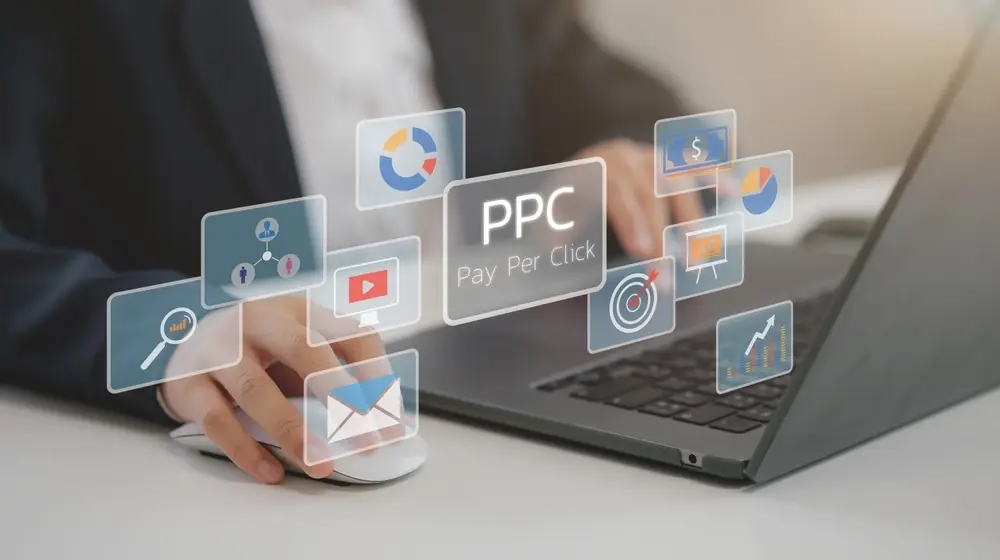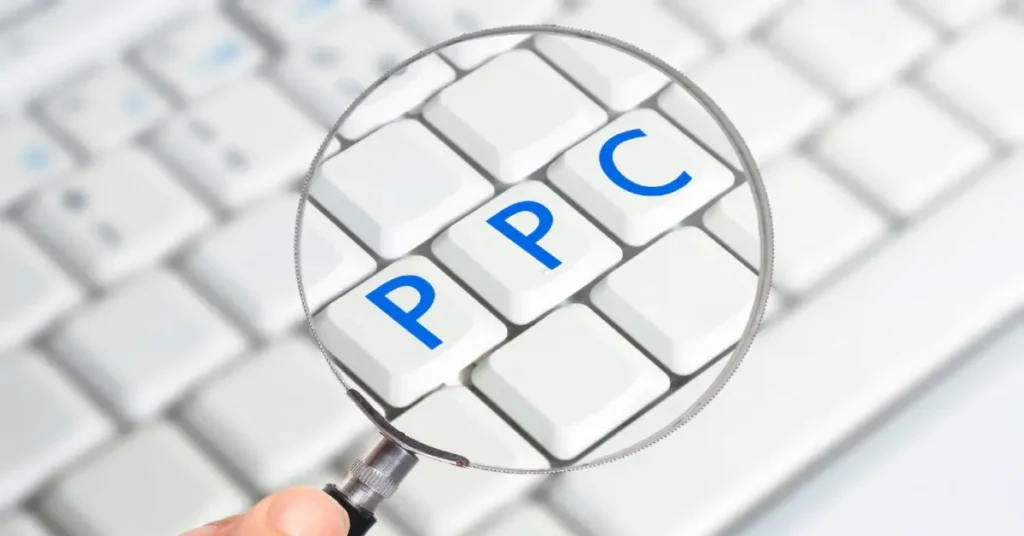As an SEO expert and copywriter, I’m excited to write an engaging and informative article about the PPC specialist. My goal is to make this complex topic clear and helpful for businesses, aspiring professionals, and curious readers alike. I will explore key aspects of this dynamic role, covering hiring strategies, career paths, essential tools, and important ethical considerations in the US market. I will weave in fresh insights and real-world examples, moving beyond common knowledge to offer truly unique value. I’ll maintain a conversational tone, avoiding jargon, and ensuring the content is easy to read and understand.
Your Guide to the PPC Specialist: Powering Digital Growth

Have you ever wondered who makes those targeted ads pop up just when you’re thinking about a new pair of shoes or a weekend getaway? Chances are, a PPC specialist is behind the magic. These professionals are the architects of paid advertising, carefully crafting campaigns that connect businesses with their ideal customers on platforms like Google, Meta, and more.
In the United States, where digital advertising spending continues to surge, a skilled PPC specialist is not just an asset—they are a necessity. Businesses spent an estimated $260 billion on digital advertising in the US in 2023, a figure projected to grow. To make every dollar count, you need someone who understands the intricacies of bidding, targeting, and analytics.
Understanding the Vital Role of a PPC Specialist
A PPC specialist is an online marketing professional focused on pay-per-click advertising. This means they manage campaigns where businesses pay a fee each time someone clicks on their ad. Their main goal? To drive qualified traffic to a website and achieve specific business objectives, whether that’s generating sales, leads, or brand awareness.
Think of it this way: the internet is a vast marketplace. A PPC specialist acts as your highly skilled street vendor, knowing exactly which corner to set up shop, what signs to display, and what to say to attract the right buyers. They make sure your message reaches people actively looking for what you offer.
Why is this role so important for US businesses right now? The digital ad space is more crowded than ever. Ad costs are always changing. Without a sharp eye and deep understanding, ad budgets can quickly disappear with little to show. A good PPC specialist works to maximize your return on every ad dollar spent. They turn clicks into customers.
How to Strategically Hire the Right PPC Specialist
Hiring a PPC specialist is a smart move. But how do you find the right fit for your business? You have a few options, each with its advantages.
Defining Your Needs: In-House vs. Freelancer vs. Agency
Your choice depends on your specific business goals, resources, and the level of control you want over daily operations.
- In-House PPC Specialist: This person joins your team full-time.
- Pros: They deeply understand your company culture, products, and long-term vision. They are always available for quick meetings and direct feedback. You have maximum control over their work.
- Cons: Hiring a full-time expert can be expensive, with salaries ranging widely based on experience and location. A single person might have limited expertise across all ad platforms or complex strategies. According to Robert Half, a Paid Search Specialist’s salary can range from $52,000 to over $100,000 annually, depending on their experience and location in the US.
- Freelance PPC Specialist: This is an independent contractor you hire for specific projects or ongoing management.
- Pros: They offer flexibility and can be more cost-effective for smaller projects or budgets. You pay for the work done, often avoiding overheads like benefits. Many freelancers specialize in niches, offering deep expertise.
- Cons: Availability can be an issue if they juggle many clients. You rely on one person, which can be risky if they become unavailable.
- PPC Agency: You partner with a full-service marketing agency.
- Pros: Agencies bring a team of specialists, offering diverse expertise across multiple platforms and strategies. They often have access to advanced tools and can handle larger, more complex campaigns. Agencies provide built-in backup and scalability.
- Cons: Agencies generally cost more than a freelancer. You might have less direct contact with the individual working on your account.
When to choose each: If you have a large, consistent ad budget and want a dedicated expert immersed in your business, an in-house PPC specialist could be ideal. For project-based work or smaller budgets, a freelancer offers flexibility. If you need broad expertise, consistent support, and can invest more, an agency is often the best choice. Consider your marketing team’s size and current capabilities. Can they support an in-house expert, or do you need outside help?
Crafting an Effective Job Description or Scope of Work

Whether you’re hiring an in-house PPC specialist or outlining a project for an external expert, a clear description is vital.
- Core Responsibilities:
- Conducting keyword research to find the best search terms.
- Writing compelling ad copy that grabs attention.
- Developing bidding strategies to get the most for your budget.
- Managing ad budgets effectively.
- Running A/B tests to improve ad performance.
- Creating detailed reports on campaign results.
- Continuously optimizing campaigns for better outcomes.
- Staying current with industry trends and platform updates.
- Essential Skills:
- Analytical Thinking: Making sense of data to find opportunities.
- Data Interpretation: Understanding what numbers mean for your campaigns.
- Communication: Clearly explaining complex results to stakeholders.
- Platform Proficiency: Expert knowledge of Google Ads, Meta Ads Manager, Microsoft Advertising, and potentially LinkedIn Ads, TikTok Ads, etc.
- Required Certifications:
- Google Ads Certifications: Google offers various certifications (Search, Display, Video, Shopping, Apps, Measurement) through Skillshop. These show a specialist understands Google’s advertising products.
- Meta Blueprint Certifications: These prove expertise in Meta’s advertising platforms (Facebook, Instagram).
- Other certifications from platforms like HubSpot or SEMrush can also add value.
Beyond the basics: When you look for a PPC specialist in the US, think about your industry. A specialist with experience in SaaS (Software as a Service) will understand different metrics and customer journeys than one focusing on local retail. For instance, a specialist for a US healthcare provider must know HIPAA compliance when dealing with patient data, influencing their targeting and data collection methods. For a financial services company, they need to understand FINRA guidelines for advertising claims. This specialized knowledge can make a huge difference in compliance and campaign effectiveness.
The Hiring Process: Interviewing and Vetting Candidates
Finding the right PPC specialist involves more than just reading resumes.
- Portfolio Review: Ask for examples of past campaigns. Look beyond vanity metrics. Instead of just “more clicks,” ask: “How did they reduce Cost Per Acquisition (CPA)?” or “What was the Return on Ad Spend (ROAS)?” Look for specific A/B testing examples and their outcomes.
- Interview Questions:
- “How do you approach keyword research for a new product?”
- “Explain your process for setting up conversion tracking in Google Analytics 4 (GA4).”
- “How do you handle a campaign that isn’t performing as expected?”
- “Tell me about a time you had to adapt quickly to a major platform change.”
- “What are your strategies for managing ad spend and preventing budget overruns?”
- Reference Checks: Speak to previous clients or employers. Ask about their communication style, responsiveness, and ability to deliver results.
When vetting a PPC specialist in the US, pay close attention to how they discuss current trends like the move towards automation in Google Ads, the increasing importance of first-party data due to privacy changes, and how they stay updated on US-specific consumer behavior or policy changes. A truly knowledgeable specialist will speak to these challenges with confidence and a clear plan.
As a PPC specialist, you know that effective campaign management requires careful budget planning. This often leads to questions about how much to invest. Many wonder, for instance, “Is $10 a day Budget enough for Google Ads?” I tackled this very question in a recent article, exploring factors like your industry, competition, and conversion goals to help you understand if a modest daily spend can still yield valuable results.
Understanding PPC Specialist Pricing and Cost Structures
This is where many businesses have questions. How do PPC specialist fees work? Pricing models vary, and understanding them helps you budget effectively.
- Salary for In-House Specialists: As of June 2025, the average annual salary for a PPC specialist in the US is around $76,467, according to Salary.com. ZipRecruiter reports an average hourly pay of about $22.71. These figures can vary significantly by experience level and location. For example, a specialist in San Francisco might earn $95,500, while one in Miami might earn around $73,470. Senior roles or those with specialized skills can command much higher salaries, sometimes exceeding $100,000 annually.
- Freelancer Rates: Freelancers often charge hourly rates (e.g., $100-$150+ per hour in the US) or project-based fees. The rate depends on their experience, the project’s complexity, and their specific expertise.
- Agency Pricing Models: Agencies use various structures:
- Percentage of Ad Spend: This is very common. Agencies charge a percentage (typically 10-20%) of your monthly ad budget. So, if you spend $10,000 on ads, the agency fee might be $1,500. This model aligns incentives: as your ad spend grows, the agency earns more, encouraging them to optimize performance.
- Flat Monthly Retainer: You pay a fixed fee each month for a defined scope of services. This model provides budget predictability. Flat fees can range from $1,500 to $10,000 or more, depending on campaign size and complexity.
- Performance-Based Pricing: This model ties the agency’s fee directly to specific results like leads generated, conversions, or revenue. For example, they might get a percentage of sales directly attributed to PPC. This is often seen in e-commerce. While attractive, it requires robust tracking and clear agreements on how performance is measured.
- Hybrid Models: Some agencies combine a flat retainer with a performance bonus or a percentage of ad spend for larger budgets.
What about other costs? Beyond the core management fee, ask about:
- Setup Fees: Many agencies charge a one-time fee for initial account audits, strategy development, and campaign setup. This can range from a few hundred to several thousand dollars.
- Additional Services: Does the fee include landing page optimization, graphic design for ad creatives, advanced tracking setup, or specific reporting dashboards? Sometimes these are add-ons.
- Software and Tools: While top-tier agencies often cover their software costs, some specialized tools might be an extra expense for very specific needs.
Understanding these pricing models helps you compare proposals and choose the best financial fit. For example, a smaller business with a tight budget might start with a freelancer charging an hourly rate. A growing e-commerce brand with higher ad spend might find a percentage-of-ad-spend model with a robust agency more suitable.
According to Oberlo, the US digital advertising market continues its robust growth, projected to reach $317 billion by 2025 and account for 74.4% of total ad spend, driven by a strong economy and innovation. Search advertising leads in revenue, with social media and digital video following closely, particularly in mobile formats, which now dominate ad expenditure. Programmatic advertising and retail media networks also show significant expansion, though ad fraud remains a persistent challenge.
For Aspiring & Current PPC Specialists: Building a Successful Career

The demand for skilled PPC specialists remains high. If you’re looking to enter or grow in this field, here’s what you need to know.
The PPC Specialist Career Path
Your journey as a PPC specialist can start at an entry-level position (often called a “PPC Coordinator” or “Paid Search Analyst”). From there, you can advance to a “PPC Specialist,” then a “Senior PPC Specialist,” “PPC Manager,” or even “Head of Paid Media.” Many specialists also choose to become independent consultants or start their agencies.
Specialization is also a common path. You might become an expert in:
- E-commerce PPC: Focusing on product ads, shopping campaigns, and maximizing Return on Ad Spend (ROAS).
- B2B PPC: Generating qualified leads for business-to-business companies, often on platforms like LinkedIn.
- Local PPC: Helping small businesses attract nearby customers.
- Display/Programmatic Advertising: Managing visual ads across various networks.
Essential Skills and Qualifications
To truly excel as a PPC specialist, you need a blend of analytical and creative abilities.
- Technical Skills:
- Platform Mastery: You must know Google Ads, Meta Ads Manager, and Microsoft Advertising inside and out. This includes campaign setup, targeting options, bidding strategies, and reporting.
- Google Analytics 4 (GA4): Understanding how to set up conversions, track user journeys, and interpret GA4 data is essential for proving campaign value.
- Spreadsheets: Proficiency in Excel or Google Sheets for data analysis and bulk operations.
- Reporting: Creating clear, actionable reports for clients or management.
- Soft Skills:
- Communication: Explaining complex data in simple terms.
- Problem-Solving: Identifying campaign issues and finding solutions.
- Adaptability: The digital ad world changes constantly. You must learn new features and adjust strategies.
- Critical Thinking: Not just looking at numbers, but understanding why they are what they are.
- Certifications: These are your badges of honor.
- Google Ads (Search, Display, Video, Shopping, Apps, Measurement)
- Meta Blueprint (Media Buyer, Marketing Science)
- Other relevant certifications from platforms like HubSpot (for inbound marketing integration) or programmatic platforms (if you specialize).
Continuous Learning and Staying Ahead
The world of PPC never stops. New features, algorithms, and privacy regulations emerge constantly. To remain a top PPC specialist, continuous learning is not optional.
- Industry Resources: Follow reputable blogs (e.g., Search Engine Land, WordStream, Google Ads Blog, Meta for Business), attend webinars, and subscribe to newsletters.
- Conferences: US-based conferences like SMX (Search Marketing Expo) or Pubcon offer great learning and networking opportunities.
- Courses: Enroll in advanced courses on topics like Google Tag Manager, advanced analytics, or specific industry applications of PPC.
- Adapt to AI: Understand how artificial intelligence and machine learning are shaping PPC, from automated bidding to ad creative generation. Learn how to work with these tools.
Advanced Topics & Real-World Insights for PPC Specialists

Let’s explore areas where top-performing PPC specialists in the US gain a distinct advantage.
In-Depth Tools & Technology Used by US PPC Specialists
Beyond the core ad platforms, professionals use a suite of tools to gain an edge.
- Advanced Bid Management Platforms: For larger ad spends, tools like Optmyzr or Adalysis help automate optimization tasks, identify hidden issues, and suggest improvements. These often integrate with Google Ads and allow for more complex rule-based automation than native tools.
- Attribution Modeling Tools: Understanding which touchpoints truly contribute to a conversion is crucial. Tools that help with data-driven attribution or multi-touch attribution (beyond basic last-click) provide deeper insights. For example, some specialists use custom Looker Studio dashboards pulling data from various sources to analyze conversion paths more effectively.
- Reporting and Dashboarding Tools: While Google Ads and GA4 offer to report, tools like Google Looker Studio (formerly Google Data Studio) are essential for creating custom, interactive dashboards for clients. They aggregate data from multiple sources (Google Ads, Meta Ads, CRM, etc.) into one clear view.
- AI and Machine Learning Integration: It’s not just buzzwords. Many US PPC specialists are already using AI for:
- Ad Copy Generation: AI tools can help brainstorm and even write ad variations based on your product and audience.
- Audience Segmentation: AI can identify new, high-value audience segments based on conversion patterns.
- Predictive Analytics: Forecasting campaign performance or identifying emerging trends in US consumer search behavior.
- CRM Integration for Lead Tracking: For B2B or service-based businesses, connecting PPC data with customer relationship management (CRM) systems (like Salesforce or HubSpot) is critical. This allows specialists to track leads from click to closed sale, calculating true return on investment rather than just lead volume.
Case Studies: Real-World Impact in the US

Seeing real examples makes a difference. Let me share some common scenarios where a skilled PPC specialist delivers significant value to US businesses.
- Boosting Local Service Leads: Imagine a plumbing company in Phoenix, Arizona. Their PPC specialist focuses on hyper-local targeting, bidding on terms like “emergency plumber Phoenix” and using ad extensions to show phone numbers and locations. They set up conversion tracking for phone calls and form submissions. Result: Within three months, the company saw a 40% increase in qualified local leads and a 20% decrease in cost-per-lead, directly impacting their service bookings.
- E-commerce Sales Growth: Consider an online boutique based in Los Angeles selling sustainable fashion. Their PPC specialist uses Google Shopping Ads, dynamic remarketing to re-engage past visitors, and highly visual Meta Ads campaigns. They segmented audiences based on past purchases and browsing behavior, showing specific product collections. Result: During a key sales period, the boutique achieved a 3.5x Return on Ad Spend (ROAS), significantly outperforming previous campaigns and increasing online revenue by 25%.
- B2B SaaS Customer Acquisition: A Seattle-based software company offers project management tools. Their PPC specialist targets business decision-makers on LinkedIn Ads and highly specific search terms on Google. They focus on generating demo requests and free trial sign-ups. They also monitor competitor ad strategies closely. Result: The company saw a 15% improvement in its Cost Per Qualified Lead (CPQL) and a 10% increase in free-to-paid conversion rates within six months.
These examples show how a focused PPC specialist transforms advertising efforts into tangible business growth.
Regional Differences & Industry Specializations in the US
The US is vast, and its markets vary. A top PPC specialist recognizes these nuances.
- Where the Talent Gathers: Major tech hubs like Silicon Valley, New York City, Austin, Seattle, and Chicago have a higher concentration of PPC specialist talent and agencies. This often means more competition for talent but also a deeper pool of expertise.
- Industry Niche Focus:
- Tech/SaaS: Many specialists in California and Washington State focus on PPC for software companies, understanding complex sales funnels and long conversion cycles.
- Finance: Specialists in New York and other financial hubs might have expertise in highly regulated financial advertising.
- Manufacturing/Industrial: In the Midwest, you might find specialists who excel at B2B PPC for industrial clients, often focusing on lead generation and trade show promotion.
- Tourism/Hospitality: Florida and Hawaii often have PPC experts who understand seasonal travel trends and dynamic pricing for hotels and resorts.
- Cost of Living and Value: While salary reports provide averages, the purchasing power of a PPC specialist’s salary varies by region. A $70,000 salary in a lower-cost-of-living area might offer a higher quality of life than an $85,000 salary in an expensive city. For businesses, this means you might find excellent talent at a more competitive rate in certain regions, or you might need to adjust your compensation expectations based on the local market. This helps both job seekers find fulfilling roles and employers attract the right people.
Ethical Considerations and Best Practices for PPC

Operating ethically is not just about avoiding penalties; it builds trust and sustainable business relationships. A responsible PPC specialist understands the importance of integrity.
- Data Privacy & Compliance:
- State-Specific Laws: The US does not have one overarching federal data privacy law like Europe’s GDPR. Instead, states like California (with CCPA), Virginia, Colorado, Utah, and Connecticut have their privacy regulations. A PPC specialist must know how these laws affect data collection, targeting, and consent, especially for residents of those states. For example, the CCPA grants consumers rights regarding their personal information, impacting how businesses handle data for remarketing campaigns.
- Transparency: Good specialists are transparent about data usage. This includes clear privacy policies and “do not sell or share my information” links on websites, as required by laws like the CCPA.
- Ad Fraud Detection & Prevention:
- Ad fraud costs advertisers billions globally. Juniper Research reported that advertisers lost an estimated $84 billion to ad fraud in 2023, representing about 22% of global digital ad spend. This figure could rise to $172 billion by 2028.
- Common Types: Click fraud (fake clicks to exhaust budgets), impression fraud (fake ad views), and bot traffic.
- Strategies: A vigilant PPC specialist uses fraud detection tools (like CHEQ or ClickCease), monitors campaign anomalies, and works with platforms to dispute invalid activity. They protect your budget from bad actors.
- Transparency with Clients:
- An ethical PPC specialist provides clear, honest reports. They explain what the numbers mean, even if performance isn’t perfect.
- They manage budget expectations realistically. They discuss potential risks and set achievable goals.
- They avoid making exaggerated claims about results.
- Ad Creative Guidelines and Restrictions:
- Platform Policies: Each ad platform (Google, Meta) has strict rules about ad content. Specialists ensure ads comply with these policies to avoid rejection or account suspension.
- US Advertising Standards: Specific guidelines apply to industries like alcohol, tobacco, pharmaceuticals, and gambling. A PPC specialist ensures all ad copy and visuals meet these legal and ethical standards in the US.
- Inclusivity: Creating ad content that is inclusive and avoids stereotypes or discrimination is a key best practice.
Conclusion: The Future of PPC in the United States
The PPC specialist holds a key position in the evolving digital marketing world. As platforms become smarter and privacy concerns grow, their role becomes even more critical.
The future of PPC in the US involves:
- More AI and Automation: Specialists will spend less time on manual tasks and more on strategy, data interpretation, and creative thinking.
- First-Party Data Focus: With third-party cookies phasing out, collecting and using your customer data will become paramount for effective targeting.
- Cross-Platform Integration: Understanding how different ad channels work together (e.g., how a Google Search ad influences a Meta conversion) will be essential.
- Evolving Consumer Behavior: Staying tuned into how US consumers discover and purchase products online will always shape effective strategies.
For businesses, investing in a skilled PPC specialist means smarter ad spending and better results. For aspiring specialists, it’s a dynamic field offering continuous learning and impactful contributions. The role will keep changing, but the need for sharp, ethical minds to navigate the paid advertising space will only grow.
When you dive into the world of paid advertising, you quickly realize that choosing the right platform is as important as having a great strategy. I’ve covered the crucial role of the PPC specialist here, but understanding where these specialists work their magic is the next step. To help you decide which platform best fits your goals, I’ve put together a detailed comparison in my post, Paid Adverts Platforms Compared: Choosing the Right One.

